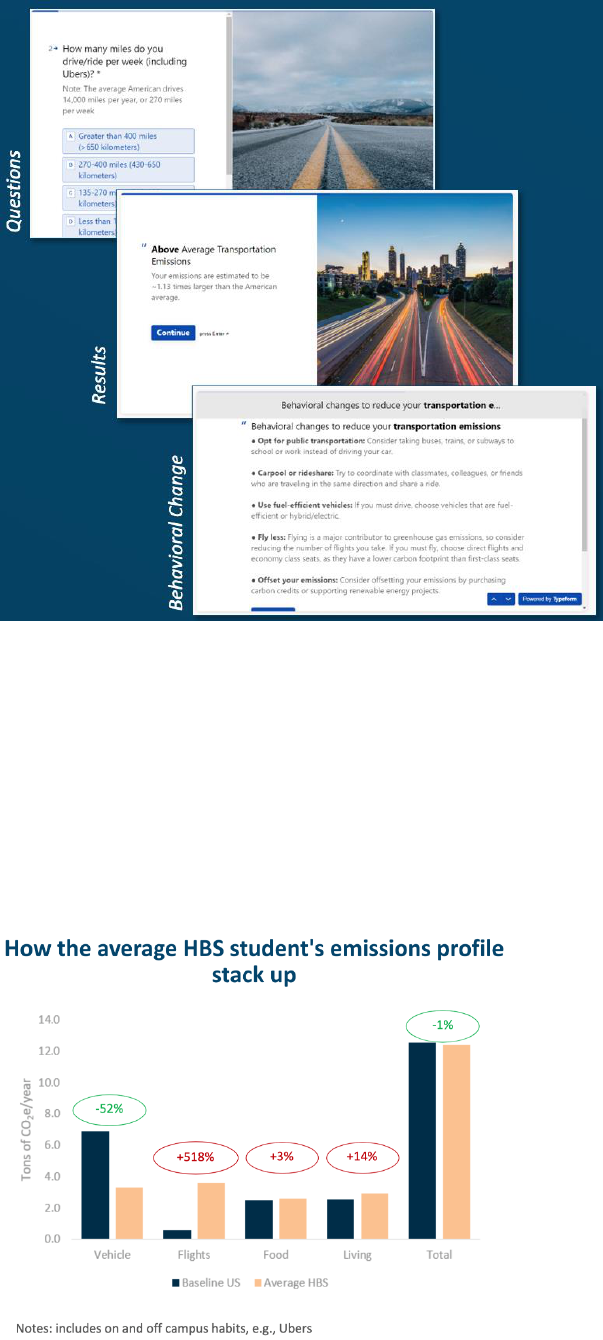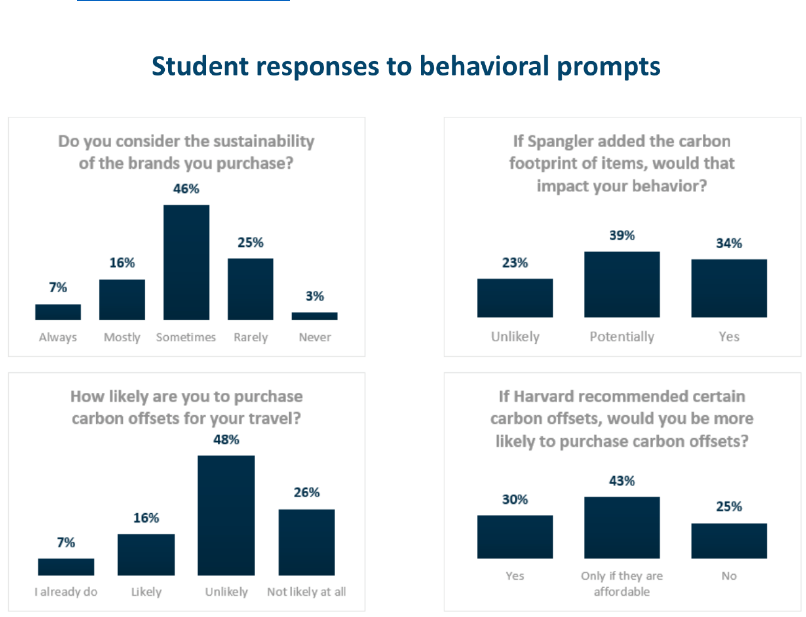
Emissions Prole of HBS Students:
Assessing student behavior & potenal intervenons
Authored by Student Sustainability Associates Zach Denny, Tatiana Theoto, Wray Wang
Climate change is one of the most pressing issues facing the world today, and it is
incumbent upon everyone to take action to mitigate its effects. Over 20% of U.S.
emissions are directly attributed to household consumption, and this figure is closer to
80% when indirect emissions are considered. The average carbon footprint of the
wealthiest households is over five times that of the poorest households. Harvard
Business School (HBS) students’ expected salary after graduation puts students in the
top 10% earners in the U.S., making it even more important to create awareness around
emissions and provide concrete trade-offs. HBS' mission of "educating leaders who
make a difference in the world" reinforces the importance of creating awareness around
the climate crisis among HBS students.
Over the past year, Student Sustainability Associates team developed a survey to
identify emissions buckets and understand HBS students' emissions profile, provide
practical advice on how to reduce emissions, and highlight the importance of behavioral
changes to fight climate change.
Survey Overview
The goals of the survey were to raise awareness around HBS' average household
emissions, provide practical advice on how to reduce the emissions footprint, and
highlight the importance of behavioral changes and investments to fight climate
change. The survey grouped activities into emissions buckets and asked questions
intended to measure the respondent's emissions in each bucket. The SSAs team
obtained feedback from various stakeholders on the survey before launching. The
survey was conducted for a period of two weeks, and the results were analyzed and
presented to stakeholders at HBS and Harvard University including the Business &
Environment Initiative.
The survey had 61 respondents and comprised five sections: transportation (ground,
air), food, living, and consumption (goods, services). Participants received live feedback
on their emissions profile (i.e., above/below U.S. average emissions) and built-in
educational aspects with behavioral change suggestions according to each person's
emissions.

Survey Interface
Survey Results
The results showed that total emissions of an average HBS student are roughly
equivalent to an average American; however, there are key differences in the
transportation bucket. HBS students drive half as much as the average American, largely
due to lack of car ownership while in school. In terms of flights, HBS students emit over
6x CO
2
e per year than the average American. Other behaviors are roughly equivalent.

The survey also included qualitative questions. Less than 1 in 4 of HBS students
regularly consider the sustainability of brands they purchase. There may be an
opportunity to highlight the importance of shopping sustainably to students via a
campaign, case study, or partner with the retail and luxury goods club. Adding the
carbon footprint of Spangler meals could impact more than 3 in 4 of HBS students’
purchasing behaviors. More than 3 in 4 HBS students said they are unlikely to purchase
carbon offsets; however, 75% of the students said they are willing to consider
purchasing carbon offsets if Harvard backed specific offsets. There is an opportunity to
educate Required Curriculum students (RCs) via a case study on carbon offsets.
Potential Interventions
1. Encourage alternative transportation: As the survey results indicate, HBS
students drive half as much as the average American, which is a positive sign.
However, there is still room for improvement. HBS could consider promoting
alternative modes of transportation such as biking, walking, or public transit. The
school could provide incentives such as discounts on transit passes, bike storage
facilities, or even organize biking or walking groups for students who live near
campus. Encouraging carpooling could also be a possibility.
2. Reduce flying emissions: HBS students emit over 6x more CO
2
e per year
than the average American in terms of flights. HBS could consider encouraging
students to reduce air travel by promoting virtual conferences, remote work, and
other alternatives.
3. Encourage sustainable food choices: The survey results indicate that
labeling the carbon footprint of Spangler meals could impact more than 3/4th of
HBS students. HBS could consider partnering with food providers to highlight and
explain the more sustainable options, such as plant-based meals or locally-sourced
produce. HBS could also consider sharing the carbon benefits of our food waste
reduction program, which includes donating meals to Food for Free and
anaerobically digesting kitchen scraps and plate scrapings. One final option is to
temporarily include a red sticker next to foods that are carbon intensive to
communicate to students the impact of their choices.
4. Raise awareness around sustainable goods: The survey results indicate that
less than 1 in 4 HBS students regularly consider the sustainability of brands they
purchase. HBS could consider partnering with the student clubs to raise awareness
around sustainability and encourage students to make more sustainable choices.
The school could also consider incorporating additional sustainability education into
the RC curriculum, offering courses or case studies that explore sustainability issues
in consumer goods.
5. Endorse carbon offsets: The survey results indicate that more than 3 in 4
HBS students are unlikely to purchase carbon offsets. However, 75% are willing to
consider purchasing carbon offsets if Harvard backed specific offsets. HBS could
consider endorsing carbon offsets and offering a platform for students to purchase
offsets. The school could also consider partnering with a carbon offset provider to
offer discounted or bulk purchases for students.
Conclusion
The emissions profile of HBS students shows that there is room for improvement in
terms of reducing emissions. By raising awareness of the issue and providing practical
advice on how to reduce emissions, students can make a significant contribution to
fighting climate change. Behavioral changes and investments are crucial in this regard,
and HBS has an important role to play in promoting both. By taking action now, HBS
students can be part of the solution to this pressing global issue.
